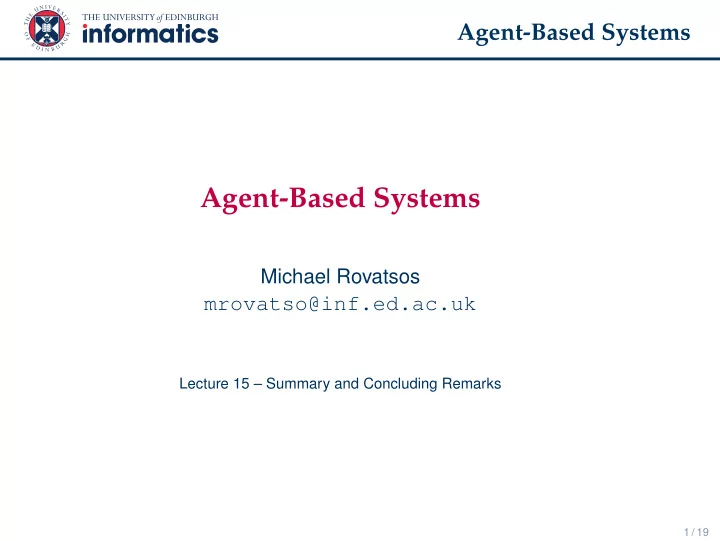

Agent-Based Systems Agent-Based Systems Michael Rovatsos mrovatso@inf.ed.ac.uk Lecture 15 – Summary and Concluding Remarks 1 / 19
Agent-Based Systems Lessons learnt • Course served as an introduction to the area of agents and multiagent systems • Today we review the central insights of the past lectures 2 / 19
Agent-Based Systems Lessons learnt: introduction, agency, abstract architectures • Pervasive trends in computing history raise new requirements • One possible answer: agents and multiagent systems • Agent notion fuzzy, criticism & abuse • Transdisciplinary area (inspiration from philosophy, sociology, psychology, economics, etc.) • Distinctions to AI, distributed systems, economics, objects, expert systems 3 / 19
Agent-Based Systems Lessons learnt: defining agency, abstract architectures • Situatedness, autonomy, reactivity, proactiveness, social ability • Rationality = proactiveness + reactivity • Formal abstract models: runs, transformer functions, behavioural equivalence, perception and action, internal states • Telling agents what to do: utilities and the MEU principles, optimal agents, predicate task specifications 4 / 19
Agent-Based Systems Lessons learnt: agent architectures • Deductive reasoning agents: logic-based agents, concurrent MetateM • Practical reasoning systems & BDI, planning • Reactive architectures: subsumption architecture • Hybrid architectures: vertical & horizontal layering (Touring machines, InteRRaP) 5 / 19
Agent-Based Systems Lessons learnt: communication and interaction • Agent communication languages • Speech act theory: communication as action • Plan-based theory of speech act semantics • The KQML/KIF and FIPA/ACL languages • Mentalistic & commitment-based semantics, associated problems • Interaction protocols, the contract-net protocol 6 / 19
Agent-Based Systems Lessons learnt: multiagent interactions • Utility- and preference-based model of interaction • Game-theoretic notions: games, strategies, equilibria • Prisoners’ Dilemma, the evolution of cooperation? • Critique of game-theoretic models 7 / 19
Agent-Based Systems Lessons learnt: coordination methods • (Generalized) Partial Global Planning • Joint intentions: commitments and conventions • Teamwork-based model of CDPS • Mutual modelling • Norms and social laws (off-line design and emergent norms) 8 / 19
Agent-Based Systems Lessons learnt: social choice • Making group decisions given individuals’ preferences • Simple plurality, sequential voting • Succinct representations, majority graphs • Borda count and Slater ranking • Arrow’s impossibility theorem • Strategic manipulation and it complexity 9 / 19
Agent-Based Systems Lessons learnt: coalition formation • How to organise collaboration and split gain? • Cooperative game theory – games with enforceable deals • The Core concept and the Shapley value • Induced subgraphs, marginal contribution nets • Simple games, weighted voting games 10 / 19
Agent-Based Systems Lessons learnt: resource allocation • How to allocate goods given preferences of agents? • Auctions: English, Dutch, FPSB, Vickrey • Incentive compatibility, lying, collusion, shills • Combinatorial auctions, bidding languages • The VCG mechanism 11 / 19
Agent-Based Systems Lessons learnt: bargaining • How to behave in a negotiation to get the best deal? • Alternating offers protocol, ultimatum games & time • Negotiation in task-oriented domains • Monotonic concession protocol & Zeuthen strategy • Bargaining for resource allocation • Finding allocations using different contracts 12 / 19
Agent-Based Systems Lessons learnt: argumentation • Negotiation using the possibility to “give reasons” • Making decisions in the presence of conflicting knowledge • Abstract argumentation systems, extensions • Logic-based argumentation • Argumentation dialogue systems 13 / 19
Agent-Based Systems Lessons learnt: Logics for multiagent systems • Logical modelling of MAS • Modal logic framework, possible worlds semantics • Axiom systems & accessibility relations (correspondence theory) • Epistemic logic, common & distribued knowledge 14 / 19
Agent-Based Systems So how does it all come together? • As said at start of terms: agent-based systems = study of integration of intelligent systems • Some methods concerned with abstract modelling of systems (abstract architectures, formal logic) • . . . others with organising joint behaviour of different components (architectures, coordination methods) • . . . and others with optimisation in the presence of different interests (game-theoretic topics, argumentation) • All these are pieces in the puzzle • but show breadth of techniques used • AI legacy vs. maths vs. logic vs. economics vs. distributed systems • field still struggles to find a topic that is not also addressed by others • that’s a good and bad thing! 15 / 19
Agent-Based Systems What we haven’t talked about • Multiagent learning • Trust and reputation • Mobile agents • Matchmaking and brokering • Multiagent organisations 16 / 19
Agent-Based Systems What we haven’t talked about • Multi-robot systems/distributed sensor networks • Distributed search & distributed constraint satisfaction • Agent programming languages and APIs • Virtual agents, lifelike characters • Agent-oriented software engineering • Social computation 17 / 19
Agent-Based Systems The exam • Two hours, two out of three questions of equal size • Roughly speaking for k marks the answer should contain k items • Emphasis on things you can define formally, calculate, or explain • Occasionally a short discussion question • All lecture and tutorial material can be examined • You won’t have to do complex or very lengthy calculations 18 / 19
Agent-Based Systems The End Thanks for your attention and participation, and good luck with the exam! 19 / 19
Recommend
More recommend